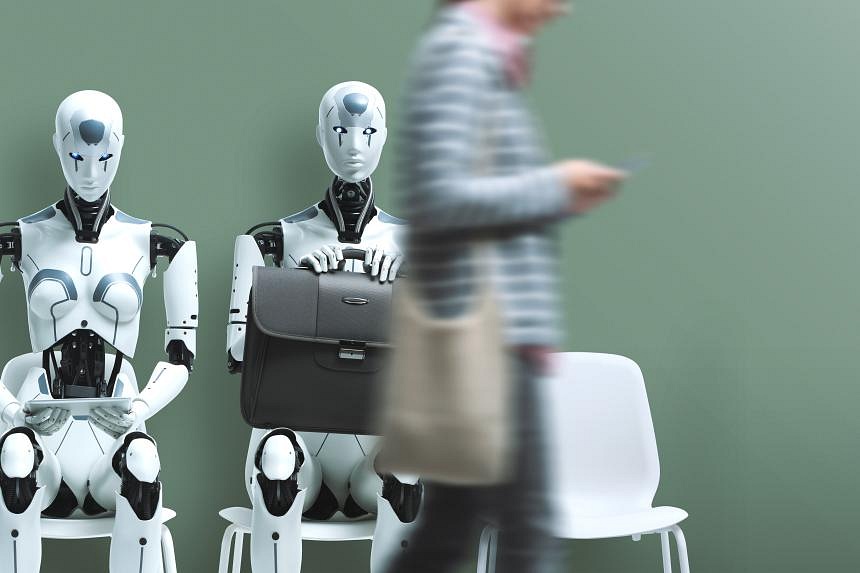SINGAPORE - Generative artificial intelligence (AI) was the biggest thing to happen in the world of work in 2023, until it was not.
The year is ending with a reality check for many bosses, who are realising that they have not figured out what to use AI for, how to use it, and if they are ready for it.
Meanwhile, more workers plodded back to the office, trailed by new coffee chains betting big on their caffeine breaks.
The ugly word “bleisure” resurged after the pandemic, as more workers returned to business travelling, with four in 10 tagging private vacations to their work trips.
What will happen in 2024?
Gen AI disrupts jobs?
Lay-offs caused by AI adoption will be held off in 2024, said tech consultancy Access Partnership’s Bensen Koh.
But workers will continue to be under pressure.
Programmers, financial analysts, customer service providers and graphic designers will be among professions most affected, while others such as plumbers, gardeners, counsellors and healthcare practitioners would less likely be so.
“The impact on workers will be uneven,” he said.
Workers already planning how to get ahead will find themselves more desirable when Gen AI goes mainstream.
“One way might be to be an early adopter, to become an AI practitioner and be the one providing advice on how best to adopt AI in your field,” said Mr Koh.
Another route would be to pick up complementary skills, he said. “For example, a graphic designer could also develop expertise in marketing and progress to design and lead campaigns.”
With elections coming up in the United States, Europe, India and Taiwan, analyst Laveena Iyer from the Economist Intelligence Unit expects Gen AI to impact politics more than business.
“Generative AI, and the fake content that it can produce, will drive misinformation and erode confidence in the political process, undermining its legitimacy,” she said.
“Any substantial election interference this time around would impact broader trust in AI.”
Ms Gloria Arlini, chief operating officer of Generation Singapore, a non-profit for retraining and job placement, believes more bosses will coach workers for specific roles and skills.
So, goodbye to old methods of training for training’s sake, such as doling out training credits or hitting a number of training hours.
There will be more apprenticeship and traineeship programmes, she added, offering smoother transitions for workers taking up skills-based jobs.
She expects more firms to formally recognise diverse skills, education qualifications and mental health differences in hiring. The workplace fairness legislation to be passed in 2024 will be an impetus.
“Singapore’s workforce is set to become more adaptable, inclusive and in tune with the demands of the new economy,” she said.
Work’s turning global, amid rise of global recruiters
Over three in 10 small- and medium-sized firms here use Employer of Record (EOR) services to manage remote teams, and most of them plan to do more of it in 2024, said EOR firm Remote, citing an IDC survey it commissioned.
An EOR is an entity that legally employs workers on behalf of another business, handling all aspects of employment including compliance, payroll and taxes.
“We see international organisations wanting to hire Singaporeans, as well as Singaporean businesses looking to expand internationally and leverage talent beyond borders,” said the firm’s chief executive Job van der Voort.
Jobs are expected to turn more global as cost savings from offshoring business functions such as call centres and payroll gradually disappear.
It could be traced to the rising costs of labour in emerging markets and automation, said Mr Charles Ferguson, general manager for Asia-Pacific at Globalization Partners.
“Businesses are recognising that strong talent pools exist in markets all over the globe and they now have the technology to tap these talent pools seamlessly,” he added.
Office rents will slide, bosses will snap up units
With more choices and lower rentals – bosses will have an array of new office spaces to choose from in 2024 before supply constricts from 2025 until at least 2027.
It will be a tenants’ market with these new office developments: IOI Central Boulevard Towers, Keppel South Central, Labrador Tower and Paya Lebar Green.
There will be about 2.9 million square feet (msf) of new space, almost 2.5 times the historical 10-year annual net demand of 1.2 msf, said Mr Anshul Jain, managing director for India and South-east Asia at Cushman & Wakefield.
All eyes are on interest rates, and if they ease, companies could be moving and expanding workspaces in the second half of 2024.
“Some offices are getting increasingly crowded, especially as more companies are encouraging a return to office,” said Mr Jain. “We anticipate that pent-up demand for offices is building and could be unleashed as business conditions improve.”
Business travel comes back
Singapore business travellers will go back to spending almost as they did in 2019, said the Global Business Travel Association (GBTA).
In 2024, corporate road warriors will drop US$5.77 billion (S$7.66 billion), just over a percentage point short of US$5.83 billion in 2019.
“The region’s rebound is being driven by factors including the reopening of China, a resurgence in key regional economies and the revival of international business travel,” said GBTA’s regional head Catherine Logan.
Workers in information and communications, retail trade and education are most likely to get back on the road.
Over eight in 10 local respondents said business travel is worthwhile to meet their business objectives, she added.
Globally, while 62 per cent of travel buyers are prioritising cost control, only 14 per cent plan to limit business travel in 2024 over economic concerns, said Ms Logan, citing a GBTA survey.
Bosses take on workers’ health, mental and physical
Bosses are looking to introduce more time off, fitness memberships and stress management seminars and courses in the next two years, says insurance company Cigna Healthcare.
This would be music to the ears of over six in 10 employees here who indicated in a Cigna survey conducted around June that they wish they had more support from their employers to live a healthier life.
Stress levels in Singapore remained high, with almost nine in 10 employees experiencing stress in the study, markedly more than the eight in 10 globally.
Burnout persists, with 96 per cent reporting at least one burnout symptom over the course of the past year.
Cigna’s chief executive for Singapore and Australia, Mr Raymond Ng, said: “These figures point to a mental health challenge among the workforce in the nation, which can also adversely affect physical well-being and cause or exacerbate chronic health problems.”
Worsened by wars, extreme weather changes and AI disruptions, burnout will also take its toll on businesses in 2024.
This was the response from eight in 10 global risk professionals surveyed by health and security management firm International SOS.
Three out of every four firms it polled said employees expect them to do more, including shouldering duties previously seen as government responsibilities, and extending responsibilities to support workers’ families in times of need.
Caffeine high, until it can hike no more
Even with more workers back at the office, in 2024, white-collar executives would have drunk enough caffeine such that new cafe chains could no longer give them the kick.
The coffee market targeting white-collar executives will stagnate, said analyst Anuran Dhar of consulting firm GlobalData.
“If we recap 2023, there are a few prominent names which pop up such as Luckin Coffee, Kenangan Coffee, Fore Coffee and Tim Hortons, among others.”
With seven of the 10 most popular global coffee chains now here, only the strongest will survive.
In the first 11 months of 2023, 303 new cafes opened and 272 cafes closed, including Flash Coffee and Spinelli Coffee.
“Consumers are getting more particular about the quality of beans used, brewing methods and roasting levels which suit their palette,” said Mr Dhar.
With rising health and wellness awareness, Mr Dhar expects that in 2024, more coffee drinkers will order plant-based milk alternatives and lighter roasts.


